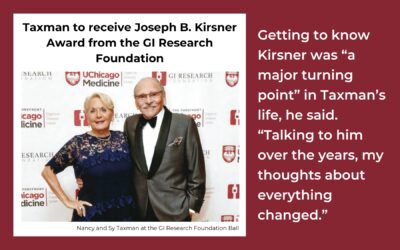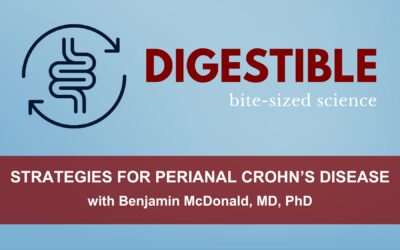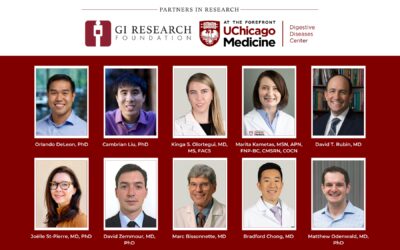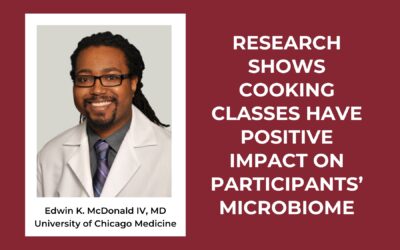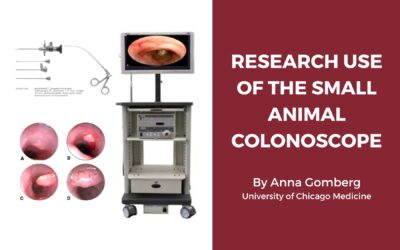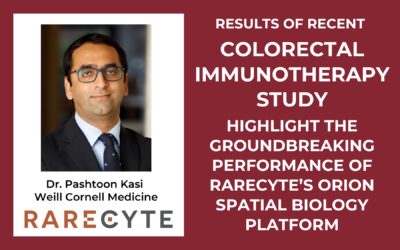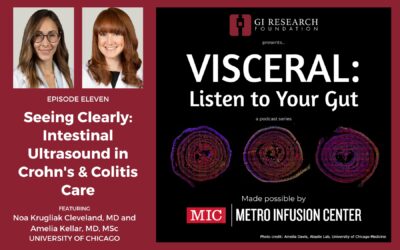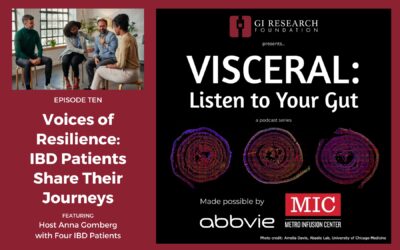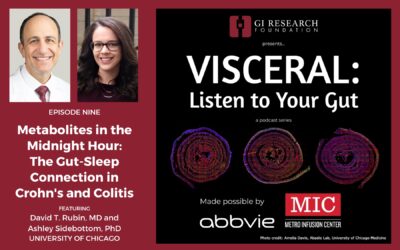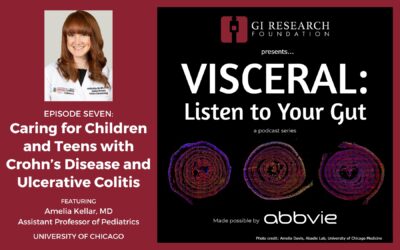Spotlight on Research
Help Secure a Congressional Gold Medal for Dr. Joseph B. Kirsner
On Friday, May 24, 2024, The U.S. House of Representatives introduced H.R. 8542, calling on Congress to award a Congressional Gold Medal to Dr. Joseph B. Kirsner, in recognition of his service to the United States during World War II and his contributions to the medical field, particularly gastroenterology.
Discovering the Gut-Brain Connection: Ashley Sidebottom, PhD
Ashley Sidebottom, PhD hypothesizes a simple blood test could profile the gut-brain health connection for better treatment outcomes.
Taxman to receive Joseph B. Kirsner Award from the GI Research Foundation
Taxman to receive Joseph B. Kirsner Award from the GI Research Foundation. Leader in Chicago real estate to be honored for his efforts as a ‘good friend, a powerful advocate, and a keen professional.’
GI Research Foundation Details 2024 Annual Ball
The event, one of Chicago’s largest fundraisers for medical research, anticipates over 500 attendees and raises over $1 million annually.
Digestible: Bite-Sized Science with Dr. Benjamin McDonald
The first issue of Digestible features Benjamin McDonald, MD, PhD, and his work to develop early detection protocols and less invasive treatments for perianal Crohn’s disease.
GI Research Foundation Awards $600,000 for Novel Research Projects
In 2024 the GI Research Foundation Awards $600,000 for Novel Research Projects Led by Investigators at the University of the Chicago
GI Research Foundation Funds Advanced Research for Two Cancer Vaccines Developed by Elicio Therapeutics
Backed by $5.4 million in grants from the GI Research Foundation, prospective cancer vaccines developed by Elicio Therapeutics show strong T-cell activation in animal trials. And similar vaccines from Elicio are already in human trials.
New Technique Uses Microscopic Bubbles to Blast Cancer With Help From GI Research Foundation
Bubbles make any kid’s day better. Now they’re improving the lives of cancer patients at the University of Chicago’s medical center as well. With a $500,000 grant from the GI Research Foundation to Dr. Osman Ahmed, UChicago Medicine will be one of only four hospitals using a new technique to noninvasively treat liver cancer.
Research Shows Cooking Classes Have Positive Impact on Participants’ Microbiome
The American Cancer Society estimates there will be over 150,000 new cases of colorectal cancer diagnosed, making it one of the most diagnosed cancers in the United States. Over 52,000 Americans will die from the disease this year. Colorectal cancer can be successfully treated when caught early. Yet, advanced cases, especially where the cancer has spread are much more likely to be fatal.
Research Use of the Small Animal Colonoscope
At the 2022 GI Research Foundation annual ball, generous guests funded purchase of the Storz Coloview Small Animal Colonoscopy System, which has proved integral to supporting the ongoing research of several University of Chicago Medicine laboratories pursuing the promise of regenerative medicine.
Results of Recent Colorectal Immunotherapy Study Highlight the Groundbreaking Performance of RareCyte’s Orion Spatial Biology Platform
The American Cancer Society estimates there will be over 150,000 new cases of colorectal cancer diagnosed, making it one of the most diagnosed cancers in the United States. Over 52,000 Americans will die from the disease this year. Colorectal cancer can be successfully treated when caught early. Yet, advanced cases, especially where the cancer has spread are much more likely to be fatal.
NS Magazine: GI Research Foundation Celebrates 62nd Annual Ball
CHICAGO, June 27, 2023 (Newswire.com) – The GI Research Foundation today announced that its CA CURE campaign drove the largest grantmaking year in its 60-year history. The campaign advances the understanding, diagnosis, and treatment of gastrointestinal cancers, and it awarded nearly $18.5 million in the fiscal year that will end on June 30.
Other Recent News
Seeing Clearly: Intestinal Ultrasound in Crohn’s & Colitis Care (Visceral podcast episode 11)
In this episode, we sit down with Dr. Noa Krugliak Cleveland and Dr. Amelia Kellar to learn how real-time imaging of the GI tract is transforming diagnosis and ongoing care of Crohn’s disease and ulcerative colitis patients.
Discovering the Gut-Brain Connection: Ashley Sidebottom, PhD
Ashley Sidebottom, PhD hypothesizes a simple blood test could profile the gut-brain health connection for better treatment outcomes.
Voices of Resilience: IBD Patients Share Their Journeys (Visceral podcast episode 10)
In this compelling episode, host Anna Gomberg brings together four courageous IBD patients to share their personal journeys with Inflammatory Bowel Disease (IBD).
Taxman to receive Joseph B. Kirsner Award from the GI Research Foundation
Taxman to receive Joseph B. Kirsner Award from the GI Research Foundation. Leader in Chicago real estate to be honored for his efforts as a ‘good friend, a powerful advocate, and a keen professional.’
GI Research Foundation Details 2024 Annual Ball
The event, one of Chicago’s largest fundraisers for medical research, anticipates over 500 attendees and raises over $1 million annually.
Metabolites in the Midnight Hour: The Gut-Sleep Connection in Crohn’s and Colitis (Visceral podcast episode 9)
This episode of Visceral is for parents and anyone else touched by pediatric IBD. We feature Amelia Kellar, MD, Director, Pediatric Intestinal Ultrasound Program.
Digestible: Bite-Sized Science with Dr. Benjamin McDonald
The first issue of Digestible features Benjamin McDonald, MD, PhD, and his work to develop early detection protocols and less invasive treatments for perianal Crohn’s disease.
Visceral: Podcast Episode – Keeping it Moving: Gut Motility and Digestive Health (episode 8)
This episode of Visceral is for parents and anyone else touched by pediatric IBD. We feature Amelia Kellar, MD, Director, Pediatric Intestinal Ultrasound Program.
Visceral: Podcast Episode – Caring for Children and Teens with Crohn’s Disease and Ulcerative Colitis (episode 7)
This episode of Visceral is for parents and anyone else touched by pediatric IBD. We feature Amelia Kellar, MD, Director, Pediatric Intestinal Ultrasound Program.



